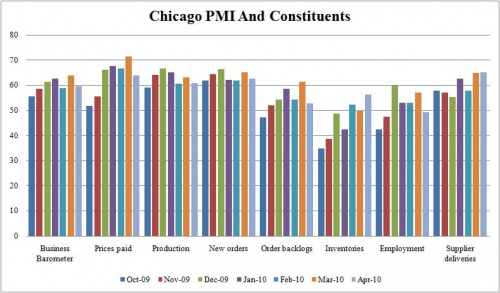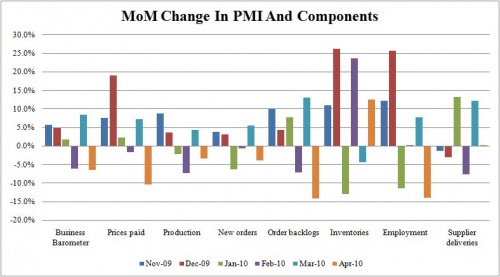Maggio 30, 2010 EcoAnemia
Spagna verso l’abisso
In questo fine settimana, abbiamo il tempo di poter dare uno sguardo alle variabili macro in questi ultimi giorni piuttosto trascurate.
Iniziamo dal Chicago PMI index, che mostra il maggior declino dall’inizio dell’anno, -6.4% nell’ultimo mese a 59.7.


Se si esclude il dato sulle scorte di inventario, tutti gli altri componenti vediamo che hanno avuto una variazione molto negativa .
La domanda che si pone Zerohedge è assai eloquente a riguardo :
How much longer can the inventory rebuild continue ?
In effetti.
Vedremo la prossima settimana cosa ci diranno gli ISM del mese di Maggio, ma sono settimane che oramai sto preannunciando un continuo deterioramento delle condizioni macro e che l’obiettivo sarà una double-dip recession (per altro, come ben sapete da sempre insisto sul fatto che questa ripresa non è mai esistita per l’economia reale, salvo che per le grosse multinazionali).
Il fatto più importante di venerdì, inoltre, è stato – a mercati europei chiusi – il declassamento da parte di Fitch del debito spagnolo ad AA+ :
Fitch Ratings has today downgraded Spain’s Long-term foreign and local currency Issuer Default Ratings (IDRs) to ‘AA+’ from ‘AAA’. The rating Outlooks on both Long-term IDRs are Stable. Fitch has simultaneously affirmed Spain’s Short-term rating of ‘F1+’ and the Country Ceiling of ‘AAA’.
Mi stavo in effetti domandando da tempo cosa stessero aspettando, visto che le stesse previsioni sul futuro tasso di disoccupazione e sul PIL 2010 e 2010 erano appena state riviste al ribasso dallo stesso governo iberico :
The government, which is currently saddled with 20% unemployment, said that the economy will grow by 2.5 percent in 2012, down from its previous forecast of 2.9%. GDP growth in 2013 is seen at 2.7%, down from 3.1% previously. And while a realistic unemployment picture courtesy of austerity is now in the upper 20% range, a step in the right direction was the revision to the unemployment forecast, which was pushed higher to 18.9 percent in 2011, up from the 18.4 percent previously seen.
La conseguenza di queste due azioni è naturalmente stata la inevitabile seguente notizia data successivamente ancora una volta da Fitch :
Fitch Ratings has today downgraded 10 classes of CDO notes and affirmed 14 classes of CDO notes following the agency’s downgrade of Spain’s Long-term foreign and local currency Issuer Default Ratings (IDR) to ‘AA+’ from ‘AAA’. A full list of the affected securities is available on Fitch’s website at www.fitchratings.com
Una nuova tegola sui mercati e – naturalmente – sulla divisa unica europea, che nel lungo periodo non può fare altro che svalutarsi per la estrema debolezza di molti dei suoi stati.
E che in questo momento l’€ non stia crollando esclusivamente perchè sia la FED che alla SNB – che per motivi diversi non possono assolutamente permettersi un rafforzamento repentino del $ per i motivi ripetuti più volte fino alla nausea – la dà addirittura Rainer Bruederle, nientemeno che il ministro delle finanze tedesco :
The U.S. Federal Reserve is also active in currency markets, German Economics Minister Rainer Bruederle said Friday.His comments come on the heels of remarks made by his Swiss counterpart who said that the Swiss National Bank purchased euros to buttress the single currency.
“It is a regular procedure of central banks,” to intervene in currency markets, Bruederle said. “It is not a secret,” that central banks have a foreign exchange rate target, he added.
Bruederle said “eruptive” movements have to be avoided. He previously said that China holds 25 percent of its foreign exchange reserves in euros.
Per altro, quale può essere in questo momento il destino di una divisa le cui banche più piccole – ora in Spagna, domani dappertutto – dovranno assolutamente consorziarsi fra di loro per evitare la capitolazione ?
Venerdì altre 5 banche spagnole si sono fuse fra loro :
Spain’s second largest savings bank, Caja Madrid, is in preliminary merger talks with five regional savings banks, one of the lenders involved in the talks said on Friday.
Caja Avila said it is in talks for a virtual merger with Caja Madrid, Caja Insular de Canarias, Caixa Laietana, Caja Segovia and Caja Rioja.
Earlier, Spain’s largest savings bank, La Caixa, also announced merger talks with a smaller regional lender, Caixa Girona.
Following the bailout of savings bank CajaSur last weekend, the Bank of Spain is pushing harder for mergers among small savings banks, whose credit quality has deteriorated sharply due to heavy exposure to Spain’s ailing property sector.
Tempi duri ci aspettano.















